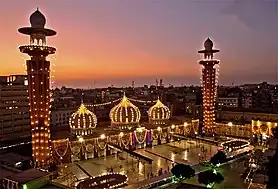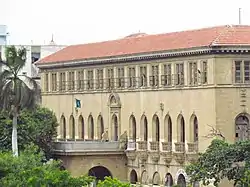| MA Jinnah Road | |
 Muhammad Ali Jinnah Road passes through part of Karachi's colonial core | |
| Former name(s) | Bandar Road |
|---|---|
| Length | 6.1 km (3.8 mi) |
| Location | Karachi, Pakistan |
| South end | Jinnah Bridge |
| Major junctions | I.I. Chundrigar Road Numaish Chowrangi Gurumandir Chowrangi |
| North end | Gurumandir Chowrangi roundabout |
Muhammad Ali Jinnah Road (Urdu: شاہراہ محمد على جناح), frequently abbreviated as MA Jinnah Road, is a major thoroughfare in central Karachi, Pakistan. The road was originally named Bandar Road (بندر روڈ ;"Port Road"), owing to the fact that it linked the city to the Port of Karachi,[1] but was later renamed in honour of Pakistan's founder, Muhammad Ali Jinnah.[2][3] MA Jinnah Road stretches 6.1 kilometres from Jinnah Bridge in the south, near the Port of Karachi, to Gurumandir Chowk, north of Mazar-e-Quaid.[1] It is one of the city's oldest roads,[4] and passes through much of the colonial era historic core of Karachi, with numerous landmarks along its route.
History
During Talpur rule, the Rah-i-Bandar road was built to connect the city's port to the caravan terminals in what is now the Serai Quarter.[5] The Rah-i-Bandar in the 1860s would eventually be further developed by the British into Bandar Road.[6][7] In 1949, the road was renamed after Muhammad Ali Jinnah, the founder of Pakistan.[1][8]
Route
MA Jinnah Road stretches 6.1 kilometres from Jinnah Bridge in the south, to Gurumandir Chowk, north of Mazar-e-Quaid.[1] Numerous landmarks are sited along this road,[8] including (from southwest to northeast): the Karachi Port Trust Building, Merewether Clock Tower, New Memon Masjid, Denso Hall, City Courts at Nanakwara, Karachi Municipal Corporation Building, Swaminarayan Mandir, Khaliq Dina Hall, NJV Government Higher Secondary School, and Mazar-e-Quaid (Jinnah Mausoleum).[1][9] It terminates at the Gurumandir Chowrangi roundabout, where several major roads converge, including: Business Recorder Road, Jehangir Road, Jamshed Road, Jigar Muradabadi Road, and Clayton Road.
Gallery
The following are heritage buildings along MA Jinnah Road which are protected by the Government of Sindh. Buildings are listed from southwest end of the road to its northwest end.
_Head_Office_Building_Karachi.jpg.webp)



 City Courts at Nanak Wara
City Courts at Nanak Wara_Head_Office_at_M.A_Jinnah_Road_-_Photo_By_Aliraza_Khatri.jpg.webp)




See also
References
- 1 2 3 4 5 Steve Inskeep (25 September 2012). Instant City: Life and Death in Karachi. Penguin Publishing Group. pp. 8, 9, 15 and 36. ISBN 978-0-14-312216-6.
- ↑ "M.A Jinnah Road karachi". www.radio.gov.pk.
- ↑ "بندر روڈ اس کا چپہ چپہ ایک داستان ہے". Daily Jang.
- ↑ Nandita Bhavnani (1 September 2008). "Kalachi, Kurrachee, Karachi: biography of a metropolis". Marg, A Magazine of the Arts. Archived from the original on 10 September 2016. Retrieved 31 May 2022.
- ↑ "Preserving cultural assets". Dawn (newspaper). 10 February 2008. Retrieved 31 May 2022.
- ↑ Sampark: Journal of Global Understanding. Sampark Literary Services. 2004.
- ↑ Rah-i-Bandar (Bandar Road) (now called M. A. Jinnah Road). Pakistan Herald Publications. 1993. Retrieved 31 May 2022.
{{cite book}}:|website=ignored (help) - 1 2 Balouch, Akhtar (31 March 2014). "The unwashed Bandar Road". Dawn (newspaper). Retrieved 31 May 2022.
- ↑ Hasan, Shazia (3 June 2018). "Minarets, alcoves, domes and devotion". Dawn (newspaper). Retrieved 31 May 2022.